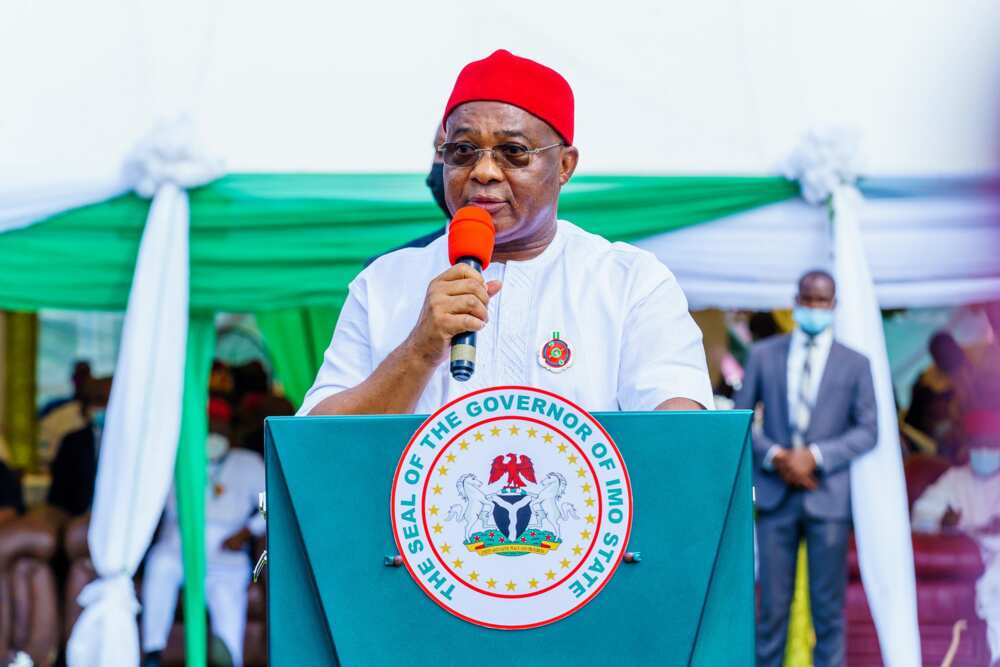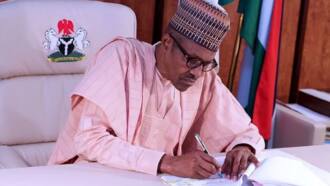Victor-Wallace: World Bank Exposes Hope Uzodimma’s Government on Fiscal Programme
Editor's note: Public affairs analyst, Unegbu Onyedikachi Victor-Wallace writes on the World Bank performance-based programme which enables them to monitor and rate the fiscal performance of states, with a particular reference to Imo state.
PAY ATTENTION: Click “See First” under the “Following” tab to see Legit.ng News on your Facebook News Feed!
Sometime in 2017, the world apex bank introduced a performance-based programme that would make them monitor and rate the fiscal performance of states.
To that effect, the World Bank entered into a mutual agreement with the federal government which gave birth to a programme known as The State Fiscal Transparency, Accountability and Sustainability (SFTAS) programme.

Source: Facebook
The rationale behind SFTAS was informed by the current serious fiscal challenges faced by the states with many unable to pay backlog of salary arrears of several months due to poor fiscal governance occasioned by high cost of governance, profligacy poor revenue drive amongst others.

Read also
Petrol Price Hike: NLC dares FG, insists on national protest, vows to shut down economy from February 1
Most states with the exception of a few have weak fiscal transparency and accountability structures characterised by unpublished budgets and financial statements, lack of timely budget implementation reports, very high budget deviation (between 30% to 55%) and their citizens are never engaged in the budget process. State Executives believe they are not accountable to the citizens and hence do not need their input in major policy decision-making processes particularly budget processes where everybody is kept in the dark.
PAY ATTENTION: Subscribe to Digital Talk newsletter to receive must-know business stories and succeed BIG!
This programme was WorldBank's strategy for rating the fiscal governance of all 36 states of Nigeria so as to encourage fiscal transparency and integrity by rewarding such states with grants and/or technical support.
Hence under the 'Program for Result' (PforR), states that meet the ranking criteria will be rewarded with a performance-based grant, whereas those that fail to meet the criteria lose the reward.
The PforR component is ex-ante open to 36 states and FCT for participation. However, in order, to be eligible to access the annual performance-based grants, states must achieve the Eligibility Criteria (EC) for the performance year. The programme allows for different entry points by states. States not achieving the EC in year 1 won’t access year 1 performance-based grants; however, they can aim to join the programme in year 2 or 3.
Eligibility Criteria (EC): For each year of the programme, states will need to publish on a timely basis the annual approved state budgets and annual audited financial statements. In years 3 and 4 of the programme, states are further required to align with international best practices through: (1) the use of the national chart of accounts/budget classification system, which is GFS compliant, to prepare the states’ annual budgets and thus foster comparability of budget classifications across the federation; and (2) states’ audited financial statements are prepared in accordance with International Public Sector Accounting Standards (IPSAS).

Read also
Nigeria's 2022 budget is riddled with corruption as BudgIT discovers over N378bn hidden duplicated projects
The performance year include;
YEAR 1; 1st Jan 2018- 1st Jan 2019
YEAR 2; 1st Jan 2019- 1st Jan 2020
YEAR 3; 1st Jan 2020- 1st Jan 2021
YEAR 4; 1st Jan 2021-1st Jan 2022.
States who meet up with the Performance, Eligibility Criteria for a particular year will be awarded a grant of $2million and as such qualify for the next year, whereas states that do not meet up with the criteria for a particular year can reapply to join the program the next year.
Imo state in 2018-2019 year of Performance Eligibility Criteria review did not meet up with the criteria hence was ineligible for the grant.
Whereas from 2019 till 2021 Imo state has met all the performance criteria for fiscal performance in governance and has received the grant of $2million twice.
This rating by the World Bank exposes Uzodimma's government on fiscal performance in governance and further reveals the level of transparency, integrity, and prudence at which Hope Uzodimma is managing the resources of the state thus growing her internal revenue base. Little wonder 75% of the 2022 budget of Imo state is projected to be funded with IGR.

Read also
FG in trouble as coalition set to mobilise Nigerians to resist gas, fuel hikes, electricity tariffs
With such signature performance ranking by a globally reputable organization like World bank, it is convenient to say that Imo state under Hope Uzodimma is performing creditably well even at a global propensity.
Disclaimer: The views and opinions expressed here are those of the author and do not necessarily reflect the official policy or position of Legit.ng.
Your own opinion articles are welcome at info@corp.legit.ng— drop an email telling us what you want to write about and why. More details in Legit.ng’s step-by-step guide for guest contributors.
Contact us if you have any feedback, suggestions, complaints, or compliments.
Source: Legit.ng

